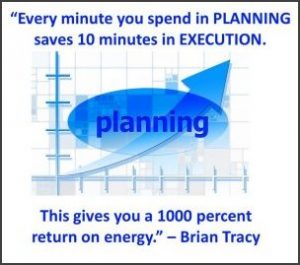Whether you’re aware of it or not, you may be sabotaging yourself by practicing work habits that you think are helping you be more efficient and effective, but they are actually damaging your work productivity and your well-being. Thankfully, you can make some simple yet powerful mindset and habit shifts once you recognize the most common productivity mistakes you’re making at work.
Let’s review the most common mistakes.
Doing Too Many Things at the Same Time
In today’s hyperconnected world, it’s easy to fall into the trap of multitasking. If you find yourself juggling a lot of office tasks at the  same time — answering emails, drafting documents, opening, and closing tabs, and being interrupted by co-workers — then you’ll suffer reduced productivity.
same time — answering emails, drafting documents, opening, and closing tabs, and being interrupted by co-workers — then you’ll suffer reduced productivity.
Although it may feel like you’re getting a lot done, you’re actually slowing yourself down. By not focusing on one single task at a time, you’re using your brainpower to jump from one activity to another without fully concentrating on anything. A study from Stanford University explains how multitasking negatively impacts those who practice it, with effects ranging from the inability to focus on important details to being less mentally organized. So, stop multitasking and start doing one thing at a time. You’ll be surprised how much you can actually accomplish.
Not Having a Plan
 Strategy meetings can feel stressful because you see the extent of the work laid out in front of you and it can feel overwhelming. Reduce your stress by breaking a large task or project into multiple mini-tasks that will make it easier and less overwhelming for you to get started and see it through to completion.
Strategy meetings can feel stressful because you see the extent of the work laid out in front of you and it can feel overwhelming. Reduce your stress by breaking a large task or project into multiple mini-tasks that will make it easier and less overwhelming for you to get started and see it through to completion.
Use strategies you learned as a student. A blog written by Special Counsel highlights the importance of preparing timelines to avoid both boredom and stress, like when you used to prepare for a major exam at school. Likewise, when planning a major event or project at the office, make sure to break down your tasks into doable chunks leading up to the due date.
Remember to plan some time for yourself. In my article on Tips for Increasing Productivity, you’ll learn how important it is to have some unscheduled time so you can flex and accommodate unexpected but important tasks and activities.
Keeping Your Goals to Yourself
Take a moment to ask yourself how many of your self-imposed deadlines you’ve missed this year. Most likely this will be a  pretty high number. While it does help to map out your work and have set dates and deadlines, you may be much more effective when you build in some accountability for yourself by telling your co-workers and family about your intentions.
pretty high number. While it does help to map out your work and have set dates and deadlines, you may be much more effective when you build in some accountability for yourself by telling your co-workers and family about your intentions.
Making your friends or your team at work aware of your deadlines will keep you accountable, as you’ll feel an extra layer of responsibility from their awareness of your intentions. You don’t have to verbally tell them every single task, but you can put up a calendar in the office with all your deadlines. Color code the tasks to mark those that are delayed if you want to build in even more accountability.
Not Taking Enough Breaks
It can be tempting to get all of your tasks out of the way by powering through without taking any breaks. However, this leads to inefficient work as you become more frustrated and stressed out throughout the day and your productivity goes down. The simple solution? Take regular breaks.
 An article on Medium reveals that the science-backed rule of thumb is to work for 52 minutes and then take a 17-minute break. Of course, you may need a different time configuration based on your own workflow or habits. What matters is that you give yourself a breather to avoid burnout. I like to break my tasks into “high brain” activities and “low brain” activities. Following the schedule that science recommends, that might look something like this:
An article on Medium reveals that the science-backed rule of thumb is to work for 52 minutes and then take a 17-minute break. Of course, you may need a different time configuration based on your own workflow or habits. What matters is that you give yourself a breather to avoid burnout. I like to break my tasks into “high brain” activities and “low brain” activities. Following the schedule that science recommends, that might look something like this:
- High brain (52 minutes): Draft my next blog.
- Low brain (17 minutes): Do weekly filing.
- High brain (52 minutes): Make final edits to product launch.
- Low brain (17 minutes): Take a coffee break with a colleague.
It’s possible to have a more productive day at the office by being organized and intentional about your work. You can stay sane despite a heavy workload by planning your activities, managing priorities, knowing your limits, and being mindful of the mistakes you often make. By avoiding these mistakes and taking care of yourself, you will be the best version of yourself in and out of the office in no time at all!
If you’d like to explore the possibility of getting some help putting systems and processes in place so you can be more productive and less stressed, let’s schedule a no-cost discovery call today.
Additional Resources
- Blog: Capturing that Elusive Thing Called Time
- Blog: Six Step Weekly Planning Process
- Blog: Overcome Procrastination
- Blog: Beat Procrastination by Finding an Accountability Partner
- Blog: Do it Now!
- Blog: All Work and No Play?
- Blog: Balance Your Life: The Nine Environments of You
- Free Webinar: Managing Priorities
- Free eBook: 7 Strategies to Overcome Overwhelm
- Guide: Dealing with Procrastination
- Guide: A Disorganized Procrastinator’s Guide to Time Management & Getting Organized
- Guide: Simple Strategies to Increase Your Productivity

Life Architect – Creating Blueprints for Purposeful & Productive Lives
Kathy@OrgCoach.net www.OrgCoach.net Follow me on Facebook





